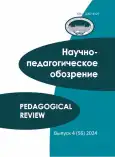No 4 (2024)
GENERAL PEDAGOGY, HISTORY OF PEDAGOGY AND EDUCATION
Quality management of formation of functional literacy of students in network interaction in the region
Abstract
 7-14
7-14


Characteristics and development path of elderly education in China in the new era
Abstract
Elderly education is related to the development of the national aging cause, which is a clear requirement and hope put forward by the national level for the grass-roots open university to do a good job in elderly education. As an important part of the lifelong education system, the vigorous development of high-quality education for the elderly and the guarantee of the right of the elderly to enjoy the same level of education are important paths for the development and improvement of the lifelong education system, and an important measure for actively coping with the aging of society. Ideally, an “education system that serves lifelong learning for all” should be an organic whole with a clear hierarchy, an appropriate structure, and an orderly articulation, integrating family education, school education, and social education. Internally, various forms of education are integrated and linked, and all kinds of educational resources are openly shared, which not only meets the learning needs of groups of different ages, but also forms a strong educational synergy to serve society; externally, this system can interact and coordinate with the development of the times, adjusting its internal structure in accordance with the changes in social needs, and thus maintaining a constant momentum of development and forming a virtuous circle. With the deepening of aging and the continuous promotion of market education, elderly education has emerged as a new industry. The university for the elderly is used as a handhold to reform the traditional way of education for the elderly, realise multi-dimensional and diversified teaching, establish effective and reliable long-term connections, and create a friendly atmosphere of love, respect and care for the elderly by all people. Forming a new business pattern of linkage and collaborative innovation of various departments, realising a sense of joy, a sense of security and a sense of worthiness for the elderly, while extending the service development of the elderly education industry, and enhancing the sustained, effective and healthy development of China’s elderly care industry.
 15-21
15-21


THEORY AND METHODS OF TEACHING AND EDUCATION
About the teacher’s methodical credo
Abstract
 22-31
22-31


Children’s journalism in project activities as a means of forming the communicative culture of senior preschoolers
Abstract
 32-40
32-40


METHODOLOGY AND TECHNOLOGY OF PROFESSIONAL EDUCATION
Individualization of foreign language training of university students using digital educational technologies
Abstract
 41-49
41-49


Use of the “I-as-Project” magazine by university students
Abstract
 50-59
50-59


The teacher of physical training as a subject of preventing obesity among school children
Abstract
 60-70
60-70


Development of professional competence of employees of the educational organization of the penal correctional system
Abstract
 71-77
71-77


Features of organizing extracurricular unsupervised work in a foreign language in a mixed format at a non-linguistic university
Abstract
 78-88
78-88


PSYCHOLOGY
Life models analysis as a method of researching domestic violence
Abstract
 89-98
89-98


Emotional intelligence and intelligent risk assessment: a typological approach
Abstract
 99-110
99-110


Models of the Self in foreign psychology
Abstract
 111-123
111-123


The role of psychological well-being and social support in coping with negative stresses with high school students
Abstract
 124-132
124-132


Psychological factors in the development of intercultural competence of foreign students
Abstract
 133-141
133-141


Studying the characteristics of the emotional state of employees of construction sector enterprises working in the region bordering the military conflict zone
Abstract
 142-150
142-150


OVERVIEWS
Personality-oriented digital education (based on the XIV winter school of teachers-2024)
Abstract
 151-160
151-160











